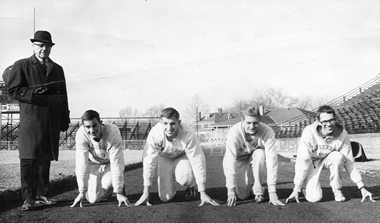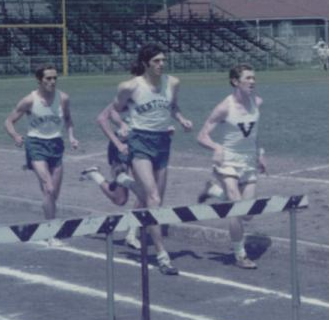March 28, 2007
Herc Alley – A Vanderbilt Coaching Legend (pdf) | CHC Archive
One of the greatest figures in Vanderbilt athletics, whose name is mostly unfamiliar except to those who knew him, is Ernest “Herc” Alley. Alley coached the Commodores’ men’s track teams from 1949-71. He found his success without a single track scholarship athlete in his duration as coach.
|
Ernest “Herc” Alley |
Alley prepped at Baylor in Chattanooga where he starred in football and track. He also ran track at the University of Tennessee (1926-28) while playing football for Robert Neyland. Before he came to Vanderbilt, Alley coached high school sports and in Murfreesboro, Tenn. at Middle Tennessee State College (MTSU).
Vanderbilt head football coach Red Sanders, brought Alley to the university as an assistant coach in 1940. Alley was made interim head coach in 1943 while Sanders left Vanderbilt for duty during World War II. In an abbreviated football schedule, the 1943 Commodores were 5-0.
When the position of head track coach opened in 1949, Alley was given the job full-time and gave up football. Alley coached several individual SEC champions, which include miler Fred Abbington, jumpers Kent Russ and Ben Rowen, discus hurler Dan Boone and javelin thrower Edward Burkhardt.
From 1949 to 1963, he compiled a record of 61-14 in dual meet competitions. This included a 40-11 mark against the SEC schools that offered scholarships to their trackmen. During one stretch from 1953 to 1958, Alley’ teams were flawless never losing a single dual meet.
In a 1962 interview with Raymond Johnson of The Tennessean, Alley said:
“When I got out of football coaching, I wanted to stay in Nashville. The business manager’s job came open when Pop Keyster returned to Chattanooga after two years here. Red gave me the job. That was in the summer of 1947. When Coach Anderson retired in 1948 (after 40 years), Red had to have somebody to coach track and since I was the only one who had any track experience, I became the coach.
“I hadn’t even seen a Vanderbilt track meet until we met Tennessee Tech in 1949. It wasn’t that I lacked interest in track. But in those years (1940-48) we had spring football practice for an indefinite period and there was scarcely any chance to see the track meets. I did go to Birmingham to the conference meet every year, I’ve always liked track.”
 |
Alley’s teams never won an SEC championship, but consistently finished in the upper half of the conference rankings. Since Vanderbilt did not give out scholarships, Alley would scour the university campus for men that ran track in high school, scholarship athletes from other sports and anyone wanting to learn track skills.
Vanderbilt’s All-American football guard George Deiderich broke a school record in the 120-yard high hurdles in 1957. All-SEC basketball star Bob Grace also obtained a school record in 1962 in the triple jump.
Again from the 1962 interview in The Tennessean Alley was asked what he looked for in a sprinter or field event participant:
“Desire to be a good track man. If a boy doesn’t have desire, he will never accomplish what he should. I don’t judge a trackman on his accomplishments but on what he has to accomplish with.
“It thrills me to see a boy come out for track who has never had a day’s experience and with hard work and desire shows a credible performance. Jack Burch didn’t come out for track until his sophomore year. Before he finished his senior year, he ran the 440 in 48.6. There was a boy who started right at the bottom.
“Lynn Mayhan is another who had no high school experience. He ran the 100 in 9.6. There are so many others who lacked high school experience that it is hard to pick then out.”
John Wade was one of Alley’s last trackmen and a member of the Vanderbilt Class of 1973. Wade recently gave this testimony on his relationship with Coach Alley:
 |
|
John Wade |
“I was privileged to letter my freshman year on the cross-country team in the fall of 1969 and 1970, and track and field in the spring of 1970. I remember Herc Alley clearly as a grand old presence around McGugin (Center) with his habitual suit, tie and short brimmed fedora. He epitomized the complete southern gentleman and caring coach, with a heritage dating back to Grantland Rice. At least, that is how he impressed us.
“We would dress out in the then new training facility that all sports shared with the football players, then jog over to the corner of Centennial Park closest to Rotiers (my favorite all time restaurant). Mr. Alley would be standing there arms crossed, waiting patiently to time our laps around the park course. I can still remember the wonderful feeling of autumn in that beautiful park. Periodically we would jog past Coach Alley; his watch in hand calmly letting us know how we were doing. We had a lot of admiration for the man.
“It was tough competing with the Tennessee track program even in those days when they had firmly established themselves as the team to beat in the SEC. Coach Chuck Rohe was at the head of an all scholarship program, and he had made a name for himself as the coached who coined the phrase, `To succeed in track and field, you have to learn to push past the pain barrier.’ Meanwhile, in an article in the Hustler (winter 1970) concerning our TIAC tie for fourth in indoor track, Herc Alley was quoted, `I was about as proud of them as I’ve been of anyone. I just hope we’ll be in better shape (health wise) this weekend (at the SEC indoor championships). We’re going to be in some real fast company. It will be Scholarship Company too; Vandy is the only SEC school that doesn’t give out track scholarships.’
“When we finished last in that meet, Coach Alley said of the Vandy cinder men, `every boy has the goal of improving as much as possible, that’s what track is about.’ Even then close to the end of his career Coach Alley would recruit talent wherever he could find it. Our best field trackman was a senior football player by the name of John Ingram who was a record setting jumper. In his senior year, not having to deal with spring football, he was a record setter for Vanderbilt against the smaller schools.
“There were other encouragements that spring season including a close win over Southwestern in Memphis. `Herc Alley, who has been the Vanderbilt track coach since 1948, said today it was the most exciting dual meet I’ve ever seen.’ The meet was tied five times during that afternoon. Vanderbilt and Southwestern were deadlocked 70-70 going into the final event–the mile relay. `On top of that, each of the first three of both teams in the relay came in neck and neck,’ Alley related. `We finally won by a foot, no more, on the last leg of the race.’ I had my best time in the quarter mile ever while running the second leg of the close race. We presented the single baton to Coach Alley after the meet that he called `One of the most cherished mementos of his long career in sports.’
“Also before our meet with Mississippi State, Coach Alley was quoted, `Wade could be one of the outstanding milers in the conference, if not the country, by his junior or senior year. He’ll get down into the 20s this year and that will be pretty good for a freshman.’ I went on to clock my best time ever in that meet at 4:27. Despite the promise of better things to come, the cinder track was paved over with tartan turf after the 1970 fall football season. A lone holdout property parcel on Natchez Trace stood in the way of the school being able to build the long promised dedicated track and field facility.
|
Herc Alley |
“My memory of the end of the men’s track and field program was of a meeting held by Herc Alley with the track team in the McGugin locker room before the start of the 1971 spring season. He told us we would need to drive each day to the nearby Hillsboro High School to work out, and for our home meets. I remember us all looking around at each other, and with mostly respects to Coach Alley, rather unanimously voting to forego the season. We were not getting scholarships to compete for the school. If the school could not manage to build us a facility of our own we wouldn’t compete. I don’t recall him arguing with us about our decision and that afternoon meeting was probably the last time I saw Coach Alley.”
Wade currently lives in Virginia Beach, Va., and is in the real estate business.
In over 30 years of service to Vanderbilt athletics in his various capacities, “Hurry Up Herc” as he was known, taught the lessons of perseverance and sportsmanship to his Commodore athletes. Alley died of cancer in August 1971. The Vanderbilt men’s track is now a club sport.
“We start practice one week after school starts in the fall,” Alley once said about his success. “We’ve just got to work hard to do it. The boys are willing, because they want to succeed badly enough to work hard. The least I can do is go out there with them.
“The spirit, determination, desire and loyalty the boys show are the reasons I coach track.”
Traughber’s Tidbit: Herc Alley has more service time as a Vanderbilt varsity head coach or assistant than any other former Commodore except for W. J. “Bill” Anderson who Alley replaced. The women’s track team is currently and proudly carrying the track torch (or baton) for Vanderbilt under the great leadership of coach Lori Shepard. The Commodores run on a nameless track, which should be the “Herc Alley Track and Field Complex!”
Next week read an exclusive interview with a former Vanderbilt athlete who was a two-time presidential candidate.
If you have any comments or suggestions you can contact Bill Traughber via e-mail WLTraughber@aol.com.

